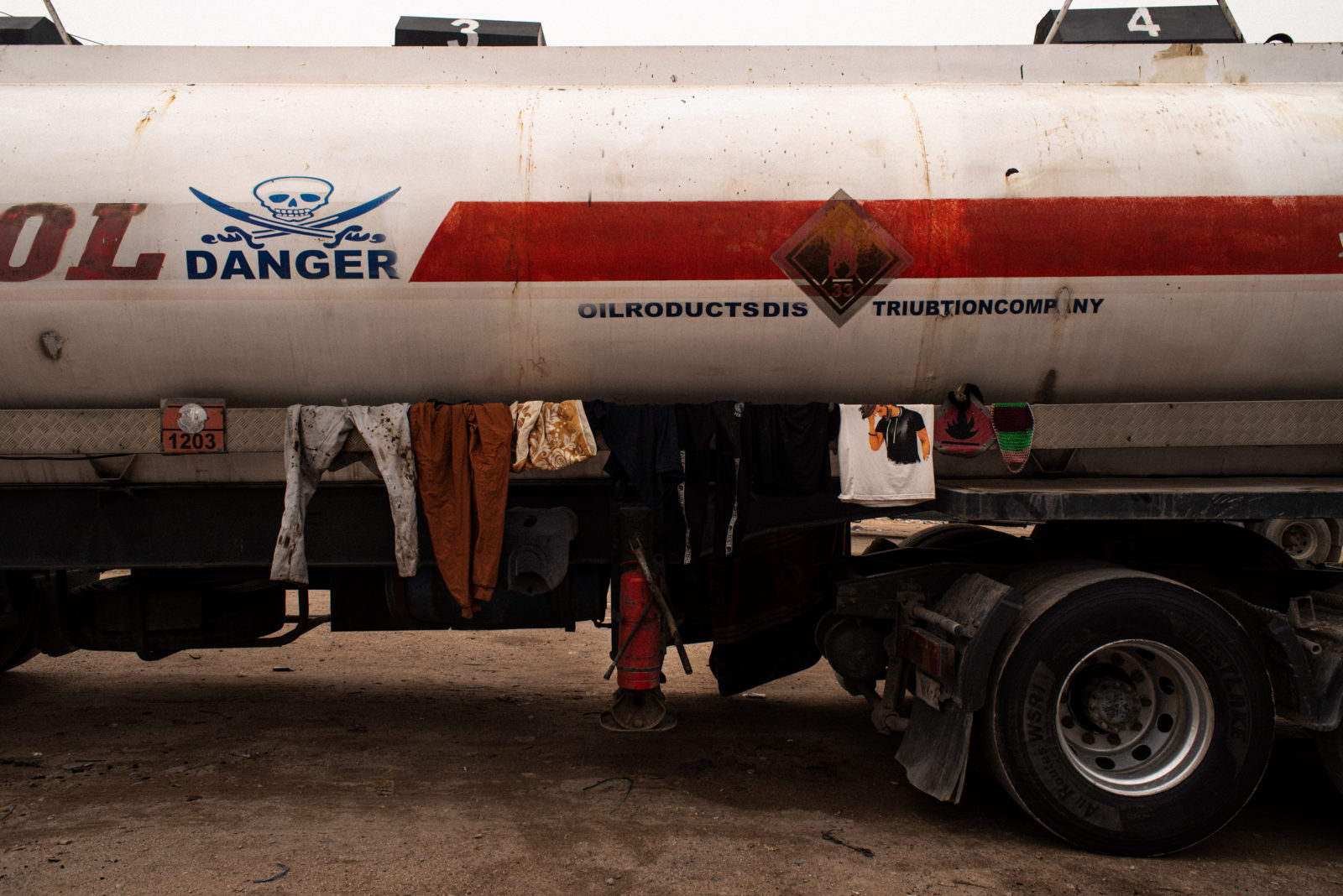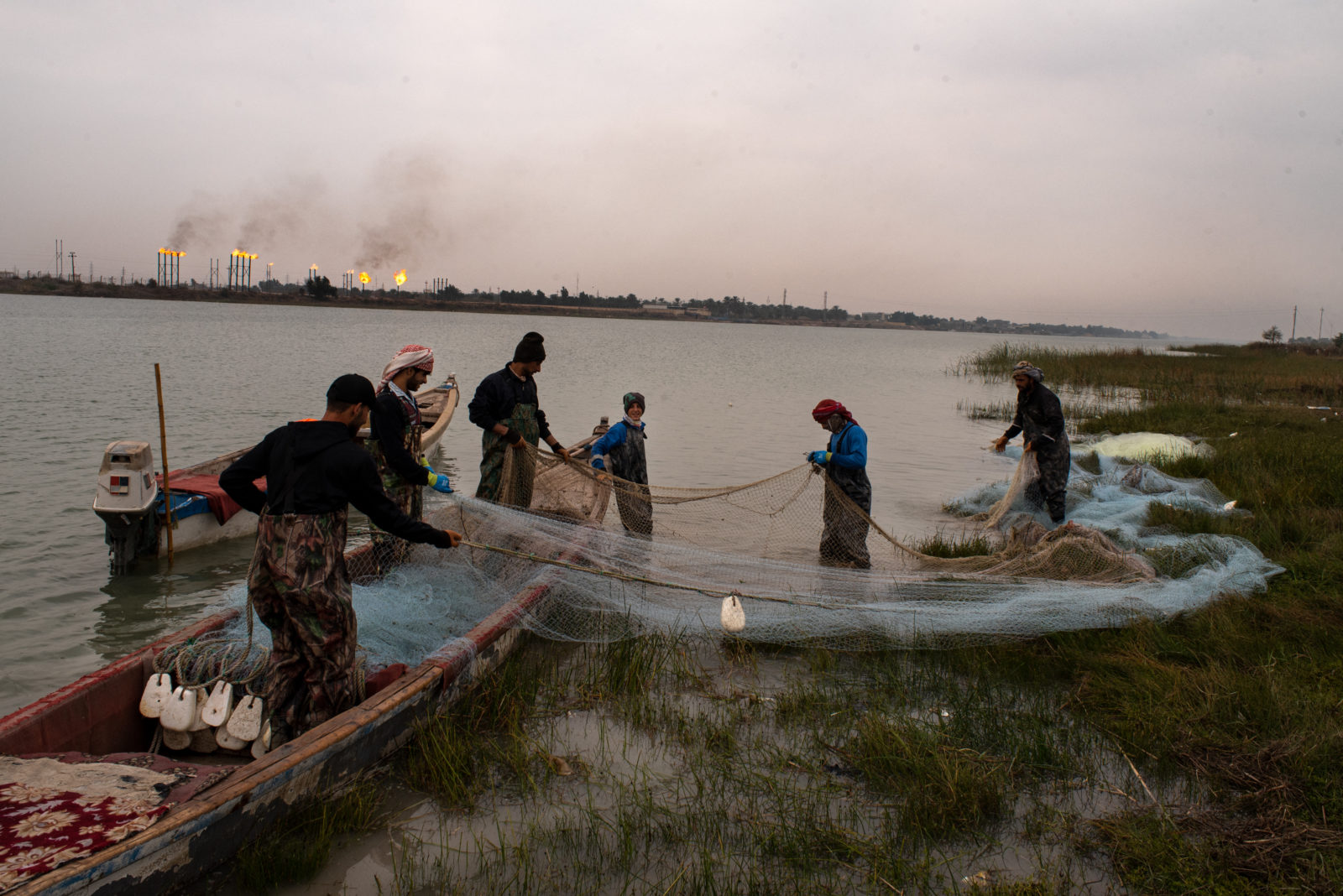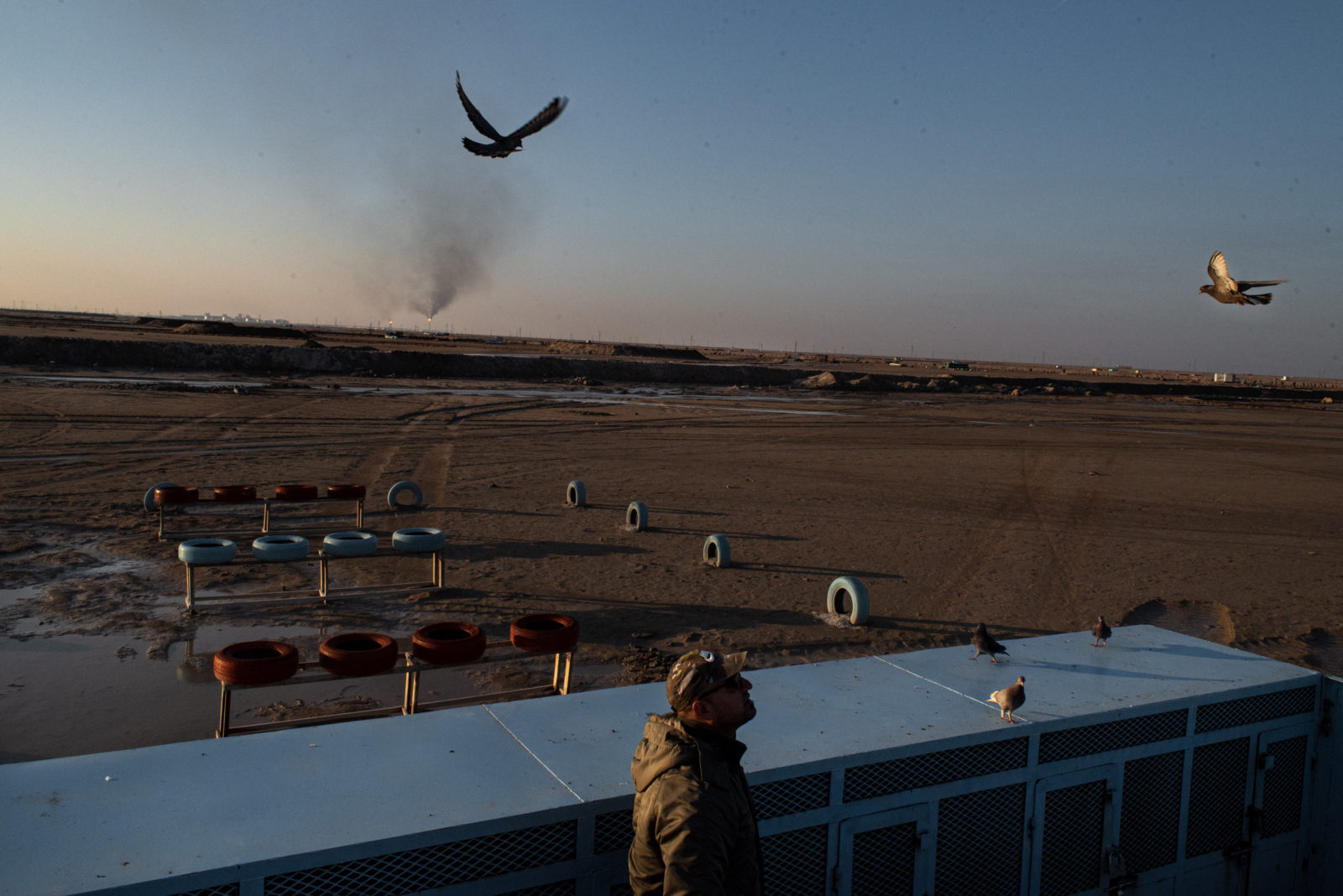Investigative
Reporting
Award
Iraq Without Water: The Cost of Oil to Italy
1. The Theft of Water
Basra, Iraq. When Saddam Hussein drained most of the Mesopotamian marshes in 1990 to punish rebels hiding among the reeds who opposed his regime, Mahdi Mutir took his few belongings, nets and small boat and fled to the Hammar marshes, north-east of Basra, where he thought he could continue to make a living from fishing. The Hammar Marshes are a large wetland complex in south-eastern Iraq and are part of the Mesopotamian Marshes, which originate from the Tigris and Euphrates River system.
These ancient rivers rise from the snow-capped headwaters of the Taurus Mountains in south-eastern Turkey, flow through valleys and gorges to the plateaus of Syria and northern Iraq, and then run parallel down to the floodplains of central Iraq. Like the arteries of the circulatory system, the rivers, joined by other tributaries, glide south and join at Al-Qurnah to form the majestic Shatt al-Arab, a river that travels two hundred kilometres before emptying into the Persian Gulf.
For millennia, the lives of the marsh dwellers have been closely linked to the Tigris, the Euphrates and the wetlands seasonally flooded by the rivers. Thanks to water and canals, these dwellers transported goods, navigated from one region to another, and they cultivated and lived from fishing in a symbiotic relationship with their environment. Mutir also lived this way. Every day, at two o’clock in the afternoon, he would leave his house to cast his nets in a traditional mashuf — a long, narrow wooden canoe used by the fisherman of this area as a main mode of transport to navigate canals and marshes. He would wait for the sun to go down and leave the next day at first light to collect them. From the fish he caught, he managed to earn around 17,000 dinars a day, about 3 euros, a small amount but enough to feed his family.
Since the beginning of 2022, everything has changed for Mutir and the people of the area. His boat sits at a trickle of water surrounded by mudflats. It is a late afternoon in January when we meet him. The seasonal rains should have filled the canals and marshes but there is no water and no fish to be found. “Italian company. Italian company,” he repeats excitedly, pointing in the direction of the plant a few kilometres away. “Eni has taken away our water.” Mutir is a simple man with a mild gaze and a welcoming smile. He agrees to accompany us to the place he calls ‘the plant.’ After passing through a checkpoint, a structure under construction — surrounded by concrete walls and control towers around the perimeter — comes into view. At the entrance flies a tattered yellow flag with the six-legged dog, the symbol of the Italian energy company Eni. Opposite it, along the bank of a canal, a dam has been built to divert water to a recently constructed reservoir. And it is precisely this dam which will prevent the surrounding marshes from being flooded. “Before they built this dam, we had water,” Mutir explains, “it is not operational at the moment, but they will use the water to extract oil.”
The dam and the under-construction facility visited by IrpiMedia are part of a project Eni is implementing through the local contractor Iraq General Company for Execution of Irrigation Projects (IGC). This facility is intended to supply water needed to extract oil in the Zubair field. The field is one of Iraq’s largest and has been operated by the multinational Italian company Eni since 2010, under a ‘technical service contract.’ The contract provides for the development of the field with a production target of 700,000 barrels of oil per day.
Iraq is the second-largest producer in OPEC, the Organisation of the Petroleum Exporting Countries, and holds the world’s fifth-largest proven crude oil reserve, with approximately 145 billion barrels. Since the start of the war in Ukraine, and the subsequent rise in oil and gas prices, Iraq has increased the value of its oil exports by 9 percent. This resulted in revenues of $ 115.5 billion in 2022. At the same time, Iraq is ranked by the United Nations as the fifth most vulnerable country in the world when it comes to the climate and water crisis.
Rising temperatures, increasingly irregular rainfall, the construction of upstream dams in Turkey and Iran, and irrigation methods rendered obsolete have caused a drastic reduction in the flow of the Tigris and Euphrates rivers over the past decade. But the already serious situation due to the aforementioned factors is made critical by the oil industry. To extract crude oil, in fact, companies operating in Iraq use a technique involving water injection. On average, one and a half to three barrels of water are needed for each barrel of extracted oil.
Extracting oil by water injection is a standard technique that dates back to the 1950s. Often there is already water mixed with oil in the wells, and some of this water is normally extracted from the reservoir along with the oil. But that is not enough, so water is added from other sources such as reservoirs, aquifers or from the sea. Saudi Arabia, for example, built a desalination plant back in the late 1970s and uses water from the Persian Gulf to supply its wells.
In Iraq, it is not this way: in the absence of investment and infrastructure, water is taken from the rivers and diverted from other uses. The fields around Basra, where two-thirds of Iraq’s oil is extracted, daily consume 25% of all the water used in the Basra governorate.
In response to requests for clarification from IrpiMedia, Eni states that “there is no use of fresh water,” and that in general, “Eni Iraq has developed a Water Management Plan that provides guidance to minimise the use of water resources, particularly fresh water, according to the drivers of operational efficiency and reuse.”
The Al Khora plant, whose construction will be completed in 2025, “will draw water from the Main Outfall Drain (MOD) canal,” Eni stated to IrpiMedia. “The MOD is a canal that collects brackish and contaminated water resulting from the drainage of irrigation water, which, after a few kilometres, flows into the Persian Gulf west of Shatt el Arab.”
Currently, however, a third of the water used for injection at Zubair (equivalent to about 156,000 barrels per day) “is supplied by the ROO consortium through a brackish surface water collection canal called Qarmat Ali.”
Just like Zubair, most of the fields in southern Iraq obtain their water from the Qarmat Ali plant, located a few kilometres south of Al Khora. Built in the 1970s, it is currently managed by the Rumaila Operating Organisation (ROO), a consortium in which the British multinational British Petroleum holds a 47.7 percent stake. The water, drawn from a canal connected to the river of the same name, is first treated and then distributed through a system of above-ground pipes to the various fields in the south, including Rumaila and Zubair, where BP and Eni operate. IrpiMedia was denied access to the Qarmat Ali plant.
According to Eni, neither the water extracted from Qarmat Ali nor the “brackish and contaminated water taken from the MOD canal” have “any impact on reduction in the volumes of water potentially usable for other purposes.”
While it is true that the water from rivers and canals used by oil companies is of poor quality, due to the concentrations of salt and other pollutants, it is not true that it is not used for other purposes. If this water is purified, it can be used by citizens for domestic purpose.
Just downstream from the Al Khora and Qarmat Ali plants, as verified by IrpiMedia, the canals from which the companies draw their water flow into a public purification plant — known as R0 (R Zero). Thirty-five percent of the water used in Basra households comes from here. Additionally, the water, although saline, permitted navigation and fishing in what remained of the delicate marshland ecosystem where Mutir lived.
2. The Zubair Oil Field (Work, Rights?)
For Mutir, deprived of water and his sole source of income, the Zubair oil field is nearby and overwhelming presence in every way: on a clear day, the wells and their plumes of smoke are clearly visible from Mutir’s house and dot the entire horizon. It takes more than half an hour to get to the wells by car. The area takes the form of an immense expanse of barren land, densely populated areas, landfills, and car parks for oil trucks.
The Zubair field itself is completely militarised, with checkpoints, cameras and barbed wire at all entrances. Around two million people live in the area around the field. The promise of development that oil was supposed to bring has not been fulfilled. Most families have no access to electricity and the roads are in poor condition. Rubbish, plastic and debris are a constant. Agricultural lands, once cultivated with tomatoes—a typical product of Zubair—are now abandoned and contaminated by oil spills.

Zubayr, Iraq (Author: Daniela Sala)
Oil exploration in Iraq began in the early decades of the 20th century. Today, more than a century later, oil constitutes more than 90% of the Iraqi state’s revenue. With Saddam Hussein’s rise to power, and the nationalisation of the oil industry in 1972, things changed dramatically. Despite the Baathist slogan “Arab oil to the Arabs,” it was not the local communities who benefited from the oil revenues.
Moreover, due to international sanctions, the Iraqi fields were largely under-utilised. There was a lack of technology and investment, and Saddam Hussein’s attempts in the 1990s to strike deals with Chinese and Russian companies were of little or no use. The US-led invasion in 2003, followed by the fall of Saddam Hussein, definitively opened the way for multinational oil companies to enter the country.
Today, in southern Iraq, multinational company presence includes Italy’s Eni in Zubair, British Petroleum (BP) in Rumaila, the US-based ExxonMobil in West Qurna, Lukoil in West Qurna 2, China’s National Offshore Oil Corporation (CNOOC) in Maysan, and also Korean company Kogas and Egypt’s General Petroleum Corporation.
The legal framework is complex and confusing, still referring to laws predating 2003. In practice, however, these companies operate mainly through a series of licensing agreements, in partnership with the state-owned Basra Oil Company. Foreign companies are entitled to a percentage of the profits per barrel of oil produced.
Regarding environmental protection obligations, there is a general provision in Articles 33 and 114 of the Iraqi Constitution introduced in 2005, stating that “the State is responsible for the protection, conservation of the environment, and its biological diversity” and “shall formulate environmental policies, in collaboration with regional governments, to ensure the protection of the environment from pollution and preserve its quality.”
***
In Shaibah, a neighbourhood in the north of the city of Zubair, sandwiched between the oil field and a refinery, the air is pungent and smelly. The only public health centre in the area, a dilapidated building lacking sufficient medical staff and medicines, has a non-functioning air monitoring system. Nouri Sadeq Hassan Salman, 33, lives just around the corner. Salman worked at the Zubair wells until 2014, when he fell ill with chronic kidney failure. He is now waiting for a transplant. “I worked in the reservoir from 2011 to 2014. I left the job in 2014 because I got sick. The doctors told me that the illness was caused by air pollution and the conditions of the place where I work and live. There was smoke everywhere in the factory, I was paid by the day, without a contract and I earned $9 a day. When the doctors told me the probable cause of my illness, I was angry. How could I not be? I blamed myself for taking that job. But the truth is that there is no other option here.” His older brother and two cousins also work in the same wells. Salman receives no financial support, no pension and no insurance.
Like Salman, the vast majority of workers are subcontracted out, effectively exempting the multinational oil companies of from direct responsibilities in terms of pay and workplace safety.
In fact, the foreign companies responsible for developing the field and ensuring production can subcontract various parts of the production process to other companies, local or foreign, in agreement with the state company — the Basra Oil Company.
Only a minority of the workers in the field have direct contracts with international companies. They are almost exclusively engineers or managers, and most of them are non-Iraqis. In theory, 80% of jobs should be reserved for local workers, but as two Eni employees in Zubair and other sources close to BOC and the union confirmed to IrpiMedia, this obligation is never fulfilled.
The Zubair field and the surrounding urban areas, where Mutir, Salman and thousands of Iraqi families live, were the gateway to Iraq for US Marines and British soldiers in 2003. Fierce and violent battles were fought here, which, in addition to dead bodies and destruction, left behind mines, depleted uranium and, above all, a lasting legacy: the presence of foreign oil companies. This is what Abdilkarim Omran, president of the General Federation of Workers’ Unions in Iraq (GFWUI), thinks: “We believe that these companies have obtained contracts and licences thanks to their home countries’ participation in the war against Iraq. Firstly, because the contracts, including ENI’s for the Zubair field, made during the ‘licensing waves’ were not subject to parliamentary approval. These companies work against Iraq’s interests. Every year they promise us that they will put an end to gas flaring and instead they continue to pollute the air, water and land. The citizens are paying the price. Cancer rates are high. There are numerous cases of birth defects and stillborn children.”

Nahr Bin Umar, Iraq. Early in the morning, a group of fishermen from Qarmat Ali collect the nets on the Shatt al-Arab river. (Author: Daniela Sala)
At night, the outskirts of Basra are illuminated by a series of torches, visible from a satellite, brighter than the city itself. This is known as “gas flaring.” Along with the oil, a certain amount of naturally occurring gas escapes from the wells. In Iraq, companies that have not invested in recovering this gas, which could be stored and used to produce energy, are burning it. The companies thus release huge amounts of not only carbon dioxide into the atmosphere, but also other highly polluting substances which are harmful to public health, such as nitrogen dioxide (NO2) and sulphur dioxide (SO2).
In 2009, Shell estimated that if this gas would be used rather than burned, it would cover 70 percent of the country’s energy needs.
In 2018, within a 70-kilometre radius of Basra, more gas was burned than in all of India, China, Canada and Saudi Arabia combined. In the following years, until 2022, the trend remained unchanged.
In theory, Iraqi law prohibits gas flaring within 10 kilometres of homes, but in many areas visited by IrpiMedia, flares were observed burning gas within a few hundred metres of homes.
For years, multinational oil companies such as Eni and BP have promised to reduce flaring worldwide, but in reality, they are skirting their responsibilities. As documented in a recent Greenpeace investigation, British Petroleum’s annual emissions report does not count gas flares in the Rumaila field, claiming that it does not directly operate the field. If Rumaila were included in the report, BP’s reported emissions would double.
Even at Zubair, according to World Bank data, flaring is extremely high: In 2021, as much as 2.5 billion cubic metres of gas were burnt. However, Eni, which claims global flaring is 1.2 billion cubic metres, does not include emissions from the Iraqi field in its annual report.
In response to requests for clarification from IrpiMedia, Eni states that it “operates under a technical services contract signed with Basra Oil Company, BOC, in 2010 (…). Eni, therefore, does not control strategic decisions on the asset, including projects to reduce flaring.” For this reason, Eni would not be obliged to account for the gas flaring emissions produced at Zubair: all responsibilities, the company says, lie with BOC, including the emission count.
In any case, the details of responsibilities, environmental and otherwise, are contained in the licence agreements, signed between the foreign companies and the Ministry of Oil, which remain secret. Everything related to the companies goes through the powerful Ministry, to the point that the Department of the Environment — which in theory has the task of supervising their actions — can often do very little. ‘The government and the Ministry of Oil should oblige these companies to respect the law,” explains Walid Hamid, director of the Department of the Environment in southern Iraq. “Why don’t they burn the gas and spill the oil in other Gulf countries, but here they do? To save money. They do not want to spend or invest. It is more convenient for them to pollute, at the expense of the population.”
3. The Impact on Health: The Sick
While it is true that the data and research on the relationship between environmental aggression, pollution and public health are increasingly incontrovertible, it is equally true that epidemiological studies are needed to prove them. In Iraq, no studies have ever been conducted on the relationship between environmental pollution caused by multinational oil companies and the health of Iraqi citizens. Certainly, the political intention is not to raise the issue. According to the Ministry of Health, the official number of new cancer cases in Basra is about 2000 per year. But a document leaked by the same Ministry and viewed by IrpiMedia reports a figure of at least 8000 new cases per year. “We collect various data on occupational diseases from workers in the oil and gas industry, but it is confidential data. The information we collect must be sent directly to the Ministry and the oil companies. We know that there is an increase in tumours, but we have no power over the companies. That is up to the Ministry of Health,” explains Mai Taha Radi, director of the National Centre for Occupational Health and Safety, which is responsible for inspections inside the companies and conducting medical examinations of workers.
Those who fall ill with cancer in southern Iraq, an area inhabited by approximately seven million people, do not have much choice. Chemotherapy is provided by two public hospitals, one for children and one for adults. At the time of this writing, access to these hospitals has been suspended for all foreign journalists. Despite the lack of authorisation from the Ministry of Health, IrpiMedia was able to access and visit the oncology ward at Basra Children’s Hospital.
The hospital was built at the behest of Laura Bush, wife of former US President George W. Bush, after the 2003 invasion. Two signs are prominently displayed at the entrance. Both bear the logos of two oil companies: Italy’s Eni, and Korea’s Knoc, which are funding a new paediatric oncology ward as part of their so-called corporate social responsibility. Thirty extra beds in a hospital that currently has forty-five.
According to the contract, foreign companies are required to reinvest part of their profits in social utility projects and “local development “projects identified and managed by the Governor. Eni makes a big deal out of these projects: in Zubair, a few hundred metres from the entrance to the field, in a neighbourhood that lacks paved roads and drinking water, the company is building a school.
Then, in 2022, the company enthusiastically announced a project in partnership with the European Union and UNICEF dedicated to building a series of infrastructures to supply drinking water to more than 850,000 people. One of the projects supported by Eni, together with other companies, consists of refurbishing a water treatment plant on the Shatt Al Arab. Once completed, the plant will provide 19,200 cubic metres of water per day to the city. For comparison, in Zubair, just under 25,000 cubic metres of water per day are injected into wells, drawn from Qarmat Ali.
From 2018 to 2022, Eni, as conveyed to Irpi Media by the company, has invested “over 60 million in various social projects to support the health, water, and education sectors and strengthen infrastructure.”
In the meantime, however, with the ongoing war in Ukraine and the Russian fuel embargo, exports from Iraq are expected to increase steadily. And the major fossil fuel companies have already posted record profits: Eni has announced a group operating profit of 20.4 billion EUR for the 2022 financial year, more than double the figure for 2021. The same goes for BP, with 28 billion EUR in 2022.
***
In the early hours of the morning, the ward is still sleepy. All the beds are occupied by patients arriving from more distant cities such as Nassiriya, Amarah, and nearby Zubair. The mothers and grandmothers accompanying the sick children sleep on the floor on improvised beds. Ward nurses report a lack of chemotherapy drugs for this hospital, as well as insufficient equipment and personnel to carry out bone marrow transplants. In addition to the patients interviewed inside the hospital, IrpiMedia met with dozens of people who are ill or have lost a family member in the area around Zubair. Among them is Falah Hassan Sajed, son of Hassan Sajed, who died of liver cancer in July 2022. “The pollution killed my father. My wife has asthma, my eight children are growing up in this polluted environment. We can’t even get a job in the fields without a recommendation, and we don’t even have oil to light the stove. How can we think of fighting these companies?” he asks resignedly.

Zubayr, Iraq. (Author: Daniela Sala)
And yet there is a new generation of young Iraqis who are carrying out numerous campaigns and mobilisations to protect the air and water in Iraq, even at with the risk of losing their lives or being made to disappear. Ahmed (the name is fictitious), 32, is one of them. After the massive protests in Basra in 2018 due to the water crisis and the lack of basic services for the population, he decided to get involved and denounce the alleged crimes of the oil companies. He has already received a death threat for helping journalists document the pollution, but says, “I am doing it for my son and future generations.” Ahmed is a member of Humat Dijlah, an environmental organisation dedicated to defending the Tigris and Euphrates rivers and the Mesopotamian marshes. In recent years, many Iraqi environmentalists have been threatened, killed, kidnapped or forced to flee abroad. The latest was Jassim Al Asadi, a well-known face of the Nature Iraq organisation, who was kidnapped on 1 February 2023 and released after two weeks.
Meanwhile, despite the risks and threats, it is precisely Ahmed’s generation, born or raised in the wake of the 2003 US invasion, that is trying to start anew and has decided to do so from the water. It is Friday morning, a public holiday in Iraq. In front of the Shatt al-Arab, where the Tigris and Euphrates rivers meet, a group of environmentalists talk to passers-by about pollution and the problems caused by a lack of water resources. The rivers and canals of what was once nicknamed “the Venice of the Middle East” are open sewers, filled with waste and used for domestic and industrial discharges. If once their grandparents and parents, despite the conflicts and Saddam’s dictatorship, were able to live off the river, fish, and drink from the river — today this generation, which grew up in an oil-rich country with theoretically medium-high incomes, — no longer has access to clean, drinkable water. “Here in this land, civilisation was born. And here, if we remain silent and do nothing, we will see its end,” says Ahmed.
Contributors:
- Lina Issa, local producer. Lina Issa is a Syrian journalist, producer and fixer based between Prague and Erbil and working in Syria and Iraq since 2015. She worked for NBC, MBC , RTL, RTE , Paris match, New York Times, CNN , CBC, among others.
- Essam El Sudani, local producer.The investigation was supported by the Journalismfund Europe: https://www.journalismfund.eu/supported-projects/price-oil
Further Media publication:
- The Guardian
- The Guardian portfolio
- Alternatives Economiques
- Aftenposten, November 2023 issue
- Geographical






